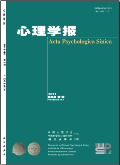心理学报2024,Vol.56Issue(9):1239-1251,13.DOI:10.3724/SP.J.1041.2024.01239
自发的善行:加工模式和情境紧急性影响亲社会行为
Spontaneous giving:Processing mode and emergency affect prosocial behavior
摘要
Abstract
Prosocial behavior is suggested to be a central feature of human life and there is an ongoing debate regarding whether individuals have,therefore,developed a general intuitive tendency to act prosocially or not.Although previous studies have found various indicators of intuitive prosociality from different perspectives,evidence on the potential causal relationship between processing mods and prosocial behavior is mixed.The social heuristics hypothesis(SHH),as a theoretical framework to address this conflicting issue,suggests that associations between processing mode and prosocial behavior are complex and multifaceted,influenced by individual variability and the contexts in which it occurs.A previous study has revealed that intuitive prosocial behavior is more likely to emerge in a perceived emergency that require immediate response.We expected that processing mode(intuition vs.deliberation)will impact people's decision-making in different helping situations. The study focused on charitable giving.Using event-related potentials(ERPs),we examined the neural mechanisms underlying the effects of processing mode and emergency on helping behaviors.We explored whether a neural signature that rapidly encodes the motivational salience of an event,the P3,can be regulated by processing mode x situation interaction or not.Participants were required to allocate varying amounts of money between themselves and charities they initially labelled as emergency or non-emergency situation that promoted intuitive or deliberative decision making.Each participant received 70 CNY.An instruction on the screen explained that the task required participants to"Accept"or"Reject"donation offers affecting their 70 CNY.To manipulate processing mode,each participant completed fast donation sessions where they were instructed to make decisions as fast as possible,and slow donation sessions where they were instructed to stop and reflect for at least 5 seconds before deciding.EEG signals were recorded during decision making. The behavioral results indicated that both average contributions and average acceptance rates were affected by emergency,with emergency events eliciting more helping behavior compared to non-emergency events.Moreover,participants considered the offer costliness when making decisions.In emergency situations,participants were more likely to accept high-cost offers than in the non-emergency situations.The ERP components analysis revealed that:a)In the early stages,intuitive processing induced a more negative anterior N1(AN1)compared to deliberative processing;b)Deliberative processing was associated with a more positive P2 compared to intuitive processing;c)In non-emergency situations,deliberative processing induced a more positive P3 compared to intuitive processing,whereas no significant differences were observed between processing mode in emergency situations. These results suggest that prosocial behavior is affected by both the emergency of event and the costliness of the offer.As costs increase,individuals are more inclined to help in emergency situations than in non-emergency situations.Furthermore,processing mode affects individual's early attention and the evaluation of stimuli.Stimuli in intuition condition can capture more early attention,while stimuli in deliberation condition receive more thorough processing.Notably,deliberative processing of non-emergency events involves greater decision-making conflicts and consumes more psychological resources.Overall,these findings shed light on the connection between processing mode and human prosociality,and extend our understanding of the social heuristics hypothesis.关键词
加工模式/亲社会行为/紧急性/社会启发式假说/事件相关电位Key words
processing mode/prosocial behavior/emergency/the social heuristics hypothesis/event-related potential(ERP)分类
社会科学引用本文复制引用
石荣,刘昌,唐慧琳,郝俊懿,沈汪兵..自发的善行:加工模式和情境紧急性影响亲社会行为[J].心理学报,2024,56(9):1239-1251,13.基金项目
教育部人文社会科学青年项目(22YJC190018),山东省自然科学基金青年项目(ZR2022QC021),中国博士后基金(2022M711914)资助. (22YJC190018)

